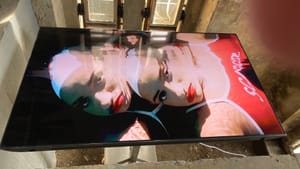Stay in the Loop
BSR publishes on a weekly schedule, with an email newsletter every Wednesday and Thursday morning. There’s no paywall, and subscribing is always free.
Taking a deeper sort of dive
The POOL: A Social History of Segregation exhibit emerges from adversity

POOL: A Social History of Segregation is meant to be immersive. It’s meant to take visitors beneath the surface, to be a deep dive into the history of segregated swimming and the interplay between social justice, public health, and access to water. All puns intended.
The multi-disciplinary exhibition housed in the historic Kelly Natatorium beneath the Fairmount Water Works was scheduled to open in September 2021, just days after Hurricane Ida inundated the region, causing damage to the interpretive center and the exhibit itself. Now, the 4,700-square-foot installation—funded with a $260,000 grant from the Pew Center for Arts and Heritage and created by designer/educator Victoria Prizzia—is set to open on Tuesday, March 22, World Water Day.
New world water
It includes archival photographs and videos, an animated film about the history of swimming by playwright/director James Ijames, site-specific murals, and interactive elements, such as a station where visitors can write about their own memories of swimming. There’s also a website, poolphl.com, featuring the words of swimming champions, aquatic activists, researchers, and scholars.
In the exhibit, video vignettes projected on the floor—a digital storytelling “pool”—include the voices of longtime Philadelphia swim coach Jim Ellis; Simone Manuel, the first Black swimmer in Olympic history to win an individual gold medal; and Cullen Jones, the first African American world record holder in swimming.
Dionne Watts-Williams, communications and special events manager for the Water Works, says the exhibit is meant to reveal history in multiple ways. Many Philadelphians may not know that the Kelly pool even exists, or that it was a swimming site for Philadelphia youth from 1961 to 1972.
The installation also unpacks the history of segregation as it played out in the nation’s municipal and private pools, and the misconceptions that persist about swimming and people of color.
“The conversation has been that we don’t know how to swim, that we are afraid of water,” says Watts-Williams, who grew up in North Philadelphia and recalls learning to doggie-paddle at the Marcus Foster Recreation Center in Nicetown; Ellis was her swim coach. “But when you look at our origins in Africa, we were often swimmers and divers.”
Explicit racial segregation—as well as lack of access to beaches and pools because of socioeconomic class or status—resulted in dangerous disparities. Black children and teens are almost six times as likely as white children to drown in a swimming pool, and more than two-thirds of Black children have little or no swimming ability.

The website and exhibition note recent Philadelphia initiatives such as a $3.7 million renovation of the Bridesburg pool and the We Can Swim! program, which offers free lessons to children from kindergarten through 6th grade.
“It’s not just about water, not just about swimming. It’s a civil rights, an equity, and an access issue,” says Watts-Williams. “POOL is a holistic experience. It’s the site, the sound, the feeling when you’re in the space that helps amplify the message.”
What, When, Where
POOL: A Social History of Segregation. March 22-September 2022, at the Fairmount Water Works, 640 Water Works Drive, Philadelphia. Free. (215) 685-0723 or fairmountwaterworks.org.
Accessibility
The Fairmount Water Works is ADA-accessible. Find out more about planning your visit online.
Sign up for our newsletter
All of the week's new articles, all in one place. Sign up for the free weekly BSR newsletters, and don't miss a conversation.

 Anndee Hochman
Anndee Hochman